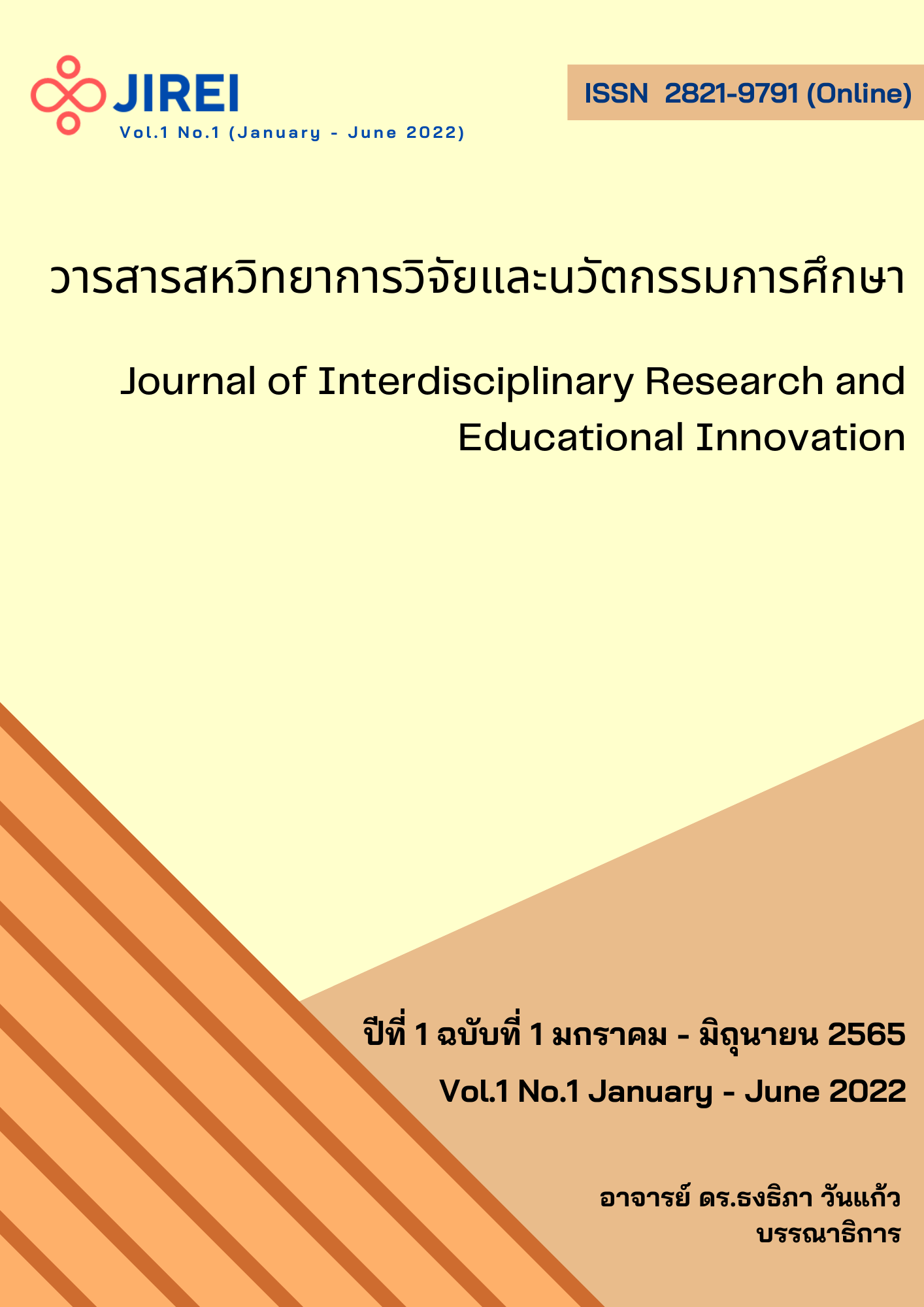The Results of Using Kahoot Application on Knowledge in Cognitive Domain The Basics of Trigonometric Ratios of Students in Grade 9
Keywords:
Kahoot application, knowledge of the cognitive domain, basics trigonometric ratiosAbstract
The aim of this research study was 1) to develop achievement knowledge of the cognitive domain in basics trigonometry ratio using Kahoot application, and 2) to study the satisfaction of the Grade 9 students who have developed a knowledge of the cognitive domain in basics trigonometry ratios using Kahoot application. The samples used in the research were Grade 9 students, Wat Phrasrimahadhat Secondary Demonstration School, Phranakhorn Rajabhat University, semester 2, Academic Year 2020 by group sampling from 1 classroom out of 4 similar characteristics classrooms, with a total sample of 46 students. The tools used in the research consisted of 1) learning management plans, 2) an activity to develop knowledge of the cognitive domain, 3) the achievement test based on criteria, and 4) a satisfaction questionnaire of grade 9 students who have developed a knowledge of the cognitive domain in basics trigonometry ratios using Kahoot application. The statistics used to analyze the data were mean, standard deviation, and a single sample t-test statistic.
The results of the research study were as follows:
1) The achievement of additional mathematics courses 6 of the 3rd graders after the development of knowledge of the cognitive domain in basics trigonometric ratios using the Kahoot application was 70 percent higher than the threshold with a statistical significance of .05, and
2) the level of satisfaction scores of Grade 9 Students who were given the activity to develop their knowledge of the cognitive domain in basics trigonometric ratios using the Kahoot application were at a high.
References
เกศินี อุปการแก้ว (2562). ผลของวิธีการสอนโดยใช้แอพลิเคชันคาฮูท (kahoot) ที่มีต่อผลสัมฤทธิ์ทางการเรียนวิชาวิทยาศาสตร์ เรื่อง ความหลากหลายของสิ่งมีชีวิต ของนักเรียนชั้นประถมศึกษาปีที่ 4 โรงเรียนบ้านไร่บน. คณะมนุษยศาสตร์และสังคมศาสตร์. วิทยาลัยเทคโนโลยีภาคใต้ ประจวบคีรีขันธ์.บุญชม ศรีสะอาด และ บุญส่ง นิลแก้ว. (2535). การวิจัยเบื้องต้น. มหาสารคาม: มหาวิทยาลัยศรีนครินทรวิโรฒ มหาสารคาม.
สถาบันส่งเสริมการสอนวิทยาศาสตร์และเทคโนโลยี (2560). คู่มือการใช้หลักสูตร กลุ่มสาระการเรียนรู้คณิตศาสตร์ (ฉบับปรับปรุง พ.ศ.2560) ระดับมัธยมศึกษาตอนต้น. กระทรวงศึกษาธิการ.
Chujareankhan, C. (2015). Using KAHOOT games to teach for teachers of dance. The art of elementary school, 6th grade, Baan Hong Kang By taking care of the idea. Lamphun:Research of Lamphun Primary Education Service Area Offce 2, Offce of the Basic Education Commission. (in Thai)
Kongpua, W. (2019). A Study on the Undergraduates' Satisfaction of KAHOOT! Used for Game-Based Learning Management of the Students Studying in Management Program at North Bangkok University, Nonthaburi Education Center. Apheit Journal (Science and Technology), Vol.1 , 114-132.
Kudthalang, W. (2010). Creaitve Thinking in Mathematics Development Using Mathematics Games For Prathom Suksa 5. Master of Education in Mathematics Education. Faculty of Education, Rajabhat Mahasarakham University. (in Thai)
Mamen, P. & Kaewurai, R. (2020). The Effects of Developing Kahoot Game Activity on the Topic of the Ecosystem for Prathomsuksa 6 Students. E-Journal of Media Innovation and Creative Education, Volume 3 , 13-24.
Offce of the Basic Education Commission. (2007). Decentralization, management and educational management. Bangkok: Agricultural Cooperative Federation of Thailand. (in Thai)
Ounlamai, P. & Boonprajak, D. (2018). The Application of Kahoot Program in Trigonometry Learning Enhancement Activity for Mathayom Suksa 4 Students in Pramochwittayaramintra School. Phranakhon Rajabhat Research (Humanities and Social Sciences), Vol.14(1), 176-191
Panich, W. (2012). The way to create learning for the disciple. 3rd edition. Bangkok: Sordsri Saridwong Foundation. (in Thai)
Pawachai, N. (2015). Study of learning outcomes on trigonometric ratios using 4 MAT for MatthayomSuksa Four Students. Master of Science in Mathematics Education. Department of Mathematics, Burapha University. (in Thai)
Suksiri, S. (2007). The Study of Effectiveness of Game Based Learning Approach. Master of Science Program in Human Resource and Organization Development (HROD), National Institute of Development Administration. (in Thai)
Tanaaukasawat, Y. (2014). A study of PIDRE supervision results using Kahoot and Google Forms in learning management: a case study of Ban Krua School Saraburi Provincial Primary Education Office Area 1. Chainat: Research of Chainat Primary Education Service Area Office. (in Thai)





